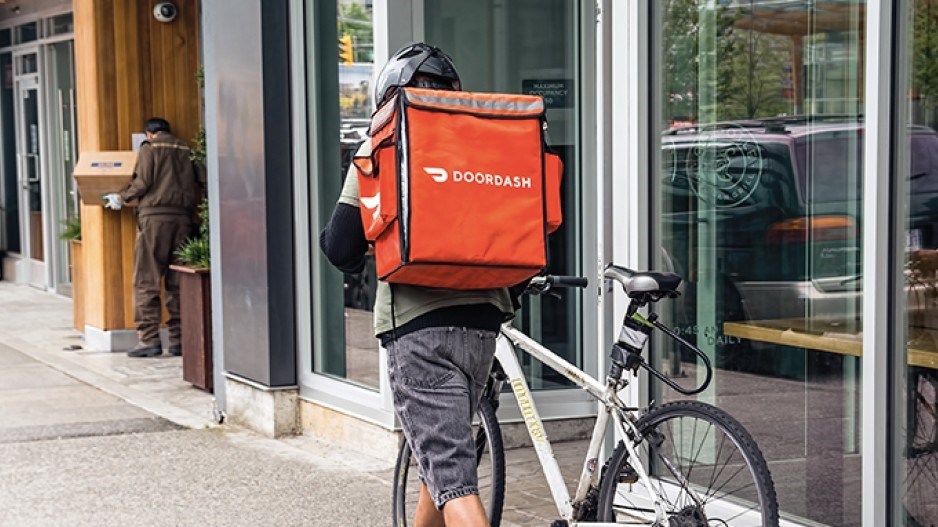Burnaby restaurant owners says they are terrified that as vaccinations ramp up, they will be getting “gouged” more money from food delivery apps soon.
Back in December 2020, the province placed a temporary cap on fees charged to restaurants by delivery companies like Uber Eats or SkipTheDishes Restaurant Services Inc.
The 15% cap on fees charged to restaurants went into effect on Dec. 27.
The Emergency Program Act order also places a 5% cap on other related fees such as online ordering or processing fees so companies can’t shift delivery costs to other fees.
The temporary caps will be in effect for three months after the provincial state of emergency is lifted as the B.C. government responds to the pandemic.
And that’s what worries Burnaby restaurant owners trying to survive after a lengthy closure in in-person dining.
“We’re just trying to catch our breath, but the lifting of the cap is on our minds,” one Burnaby Heights owner told me (they didn’t want their name used). “We’re sick of getting gouged.”
Two others said their margins are so tight because even with indoor dining open again, they can only allow so many customers at a time, plus many diners still aren't ready to return.
Other owners in B.C. feel the same way.
"I really hope they do keep the lower fees because it does help a lot," said Sharon Bond, the owner of Westbank, B.C.'s Kekuli Cafe. "Costs have gone up tremendously.
"We're in a pandemic so (everyone's saying), 'let's charge triple for everything.'"
Food delivery companies typically charge restaurants a commission for every delivery, sometimes as much as 30 per cent of the order cost. Fee caps were added by five provinces after dining rooms were forced to close for months during the pandemic, increasing their reliance on meal delivery apps to pay the bills since many were offering takeout for the first time and didn't have the mechanism to offer delivery themselves.
Ontario, B.C., Nova Scotia, Saskatchewan and Quebec temporarily capped commissions between 10 and 20 per cent for as long as stay-at-home orders or restaurant closures were in place.
When the pandemic struck, Bond had little choice but to use third-party apps for the first time to deliver bannockwiches and tacos to customers of her Indigenous restaurants.
She wants B.C.'s 15 per cent cap to stay because it helped the restaurant survive and prevent staff layoffs, but she said it will be months until they're serving a full dining room again.
Kevin Edwards, the chief executive of SkipTheDishes, wants to see restaurants rebound from the pandemic, but called the prospect of a permanent cap "scary."
"There's no chance we're going to be able to maintain our platforms with these commission caps," he said.
SkipTheDishes charged restaurants a 25 per cent commission on meals prior to the pandemic, but when the crisis began, it used a rebate to ensure local, independent restaurants pay less than 20 per cent in commission while dining in is suspended.
New restaurants joining the platform during the restrictions were not charged any commission for 30 days and those using their own staff for deliveries paid a 10.5 per cent commission.
Meanwhile, Uber, which typically charges a 30 per cent commission, dropped fees on pickup to zero, online ordering to 7.5 per cent and 15 per cent for restaurants doing their own delivery.
When asked about caps, the company said in an email that it operates at a "negative margin" and fees don't provide profit for Uber, and the company needs to be able to cover operating costs.
Provincial caps, Edwards said, were enacted with little consultation or notice and didn't consider existing relief programs or the more pressing needs of small businesses.
For example, he said many of the caps didn't zero in on independent restaurants alone, so national chains and other successful brands accounted for between 50 and 60 per cent of the rebates Skip gave out.
If caps continue, he imagines it will get harder for delivery services to expand to new markets and manage costs.
"The customer is going to have to bear the burden" he said. "You can't not be viable."
- With files from the Canadian Press, and Tyler Orton, Business in Vancouver


